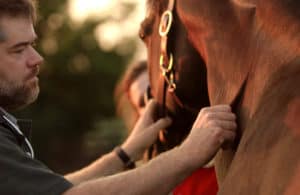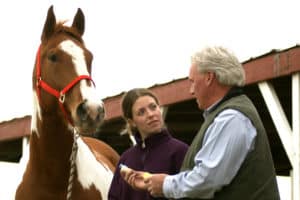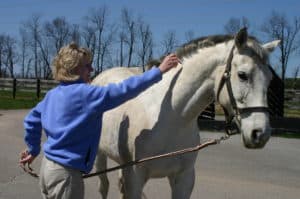Latest News – The Horse

HERDA: Hereditary Equine Regional Dermal Asthenia (AAEP 2009)
Dr. Ann Rashmir of Michigan State University talks about HERDA. (5:33)

Veterinary Outreach at Home (AAEP 2009)
Dr. Richard Markell of the Shea Center talks about veterinary outreach. (4:06)
Ohio Track Offers Help for Horses at Risk
Cincinnati's River Downs Race Track has established a "surrender stall" program for horse owners who can no longer care for their animals. The program was established in response to the removal of six allegedly malnourished horses from a farm operated by former Thoroughbred horse trainer Chad Moore, said River Down
DMSO Doesn’t Help Gastric Aspects of Endotoxemia, AAEP 2009
Endotoxemia causes delayed gastric (stomach) emptying, which can cause the stomach to retain acidic contents and cause or worsen gastric ulcers. At worst, delayed gastric emptying can lead to accumulation of reflux material and gastric rupture. Researchers investigated the effects of DMSO on delayed gastric emptying caused by experimentally induced endotoxemia, and they unfortunately found that it
World Equestrian Games Travel Tips
The 2010 Alltech FEI World Equestrian Games are the world championships of the eight equestrian disciplines of the Fédération Equestre Internationale (FEI). The competition is held every four years, and the 2010 edition is coming to Lexington, Ky., Sept 25-Oct. 10. What do you need to do in order to attend?
Cold Weather Horse Care Precautions Shared
More than 1,270 readers of TheHorse.com responded to a poll asking, “What do you do to help your horse cope with below-normal temperatures?” The responses varied for cold weather horse care.
Changes in Equine Surgical and Postoperative Care, AAEP 2009
Just 20 years ago, overall equine survival of surgical colic hovered at 39-48% due to anesthetic complications and breakdown of surgical incisions. Recent overall survival rates range from 55-95%, dependent on timely intervention and clinician/hospital experience. Postoperative management has taken great strides with improved patient monitoring, stabilization of cardiovascular status, and car
Equine Influenza PCR Assay Available in Kentucky
The Livestock Disease Diagnostic Center (LDDC) at the University of Kentucky now offers a molecular diagnostic assay to detect the H3N8 equine influenza virus (also known as type 2 equine influenza virus) in clinical specimens. Currently only the H3N8 subtype is associated with equine influenza virus outbreaks around the world.
New FEI Drug Regulation Web Site Launched
The Fédération Equestre Internationale (FEI) has launched a new Web site dedicated to its ongoing Clean Sport Campaign.
The Web site contains information about the regulations that the FEI is implementing this year to combat doping in equestrian sports.
Betsy Cohen on Proper Leather Care: Horse Tip Daily #129
Betsy Cohen has worked for over 10 years with Bickmore. Betsy joins us to share her knowledge on leather care and horse care. Today she
Less Than 500 Survey Responses Needed to Reach 10,000!
Please help the American Horse Publications–a group of nearly every equine-related magazine, newsletter, breed organization, Web site, and horse publishing entity–reach the 10,000-mark with the
Surely Awesome Part 3: Surgery
On Monday in this new excerpt from the book Equine ER, Surely Awesome came to Rood & Riddle Equine Hospital in Kentucky with a shattered

Challenges of EPM Diagnosis (AAEP 2009)
Dr. Amy Johnson of the University of Pennsylvania New Bolton talks about the challenges of diagnosing EPM. (2:59)

Preparing for Colic (AAEP 2009)
Dr. Anthony Blikslager of the North Carolina State University talks about colic in horses. (7:39)
Mare Aborts Full Sister to Barbaro
One day after Barbaro’s brother Lentenor broke his maiden in impressive fashion, farm managers reported that La Ville Rouge, the dam of both horses, aborted her 2010 foal.
The foal, which was aborted Dec. 24, 2009, had been sired by Dynaformer and would have been a full sibling to the 2006 Kentucky Derby winner, as well as the first filly produced from La Ville Rouge.
Horse Vets Say: Hold the Persimmons, Please (AAEP 2009)
Persimmons are tropical, bright orange fruits that are claimed to have many health benefits in humans, from helping prevent cancer to arresting the hiccups. However, they have a dark side–they can form hard “concretions,” or fiber masses, in the gastrointestinal tracts of horses and humans that can require surgery to remove.
Such masses, termed bezoars, are even harder











